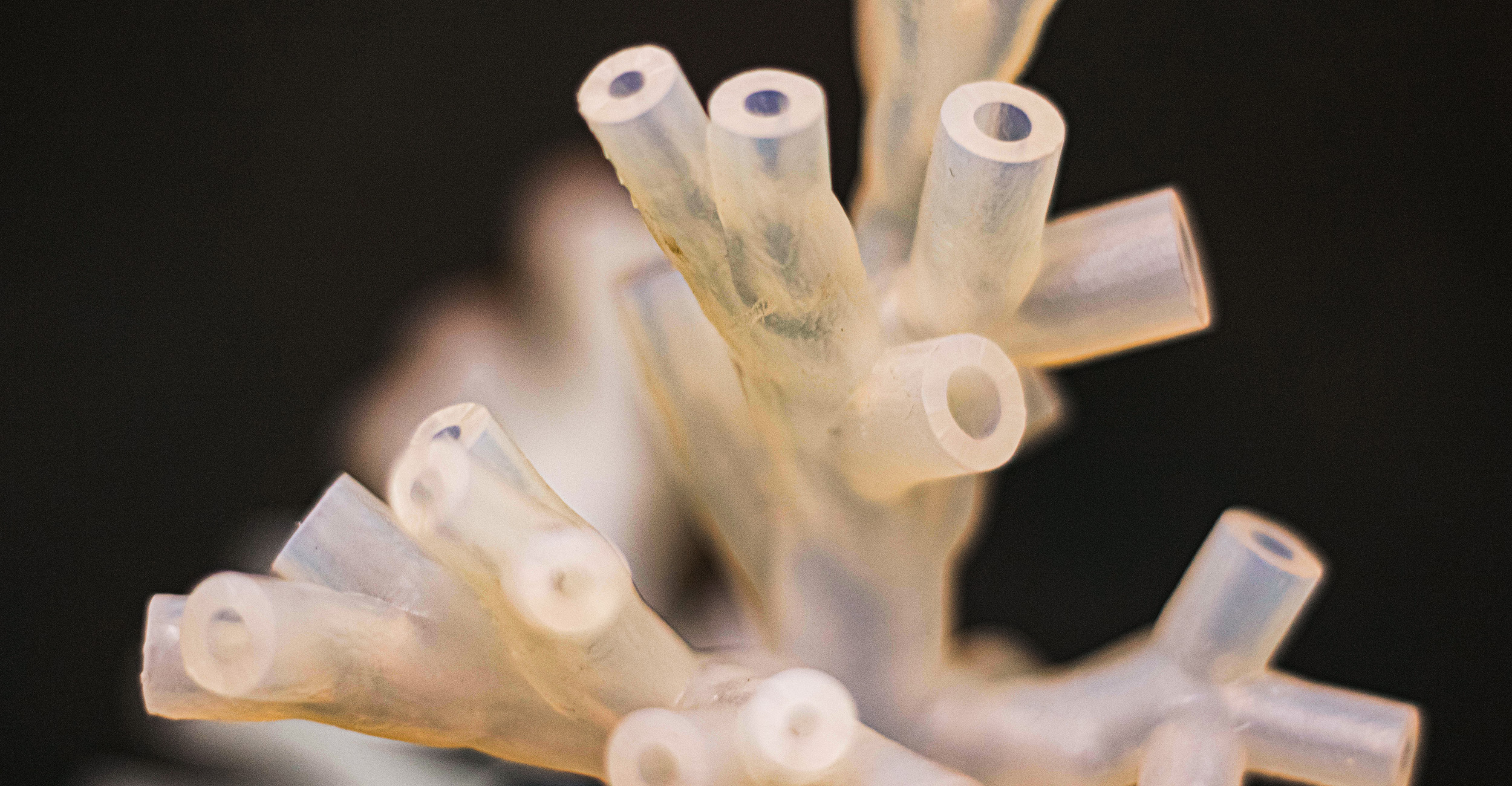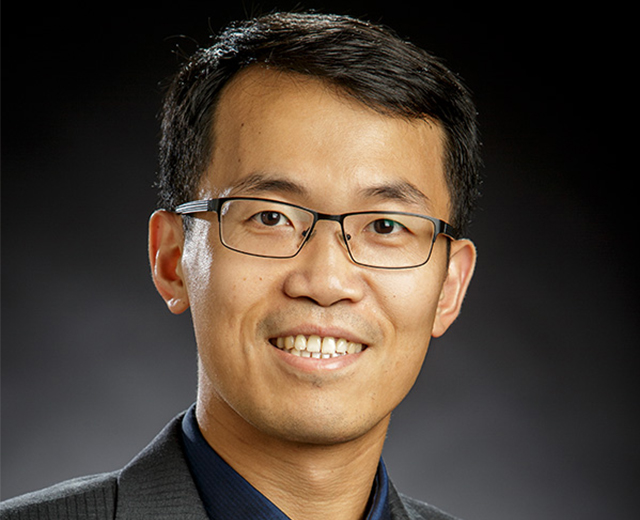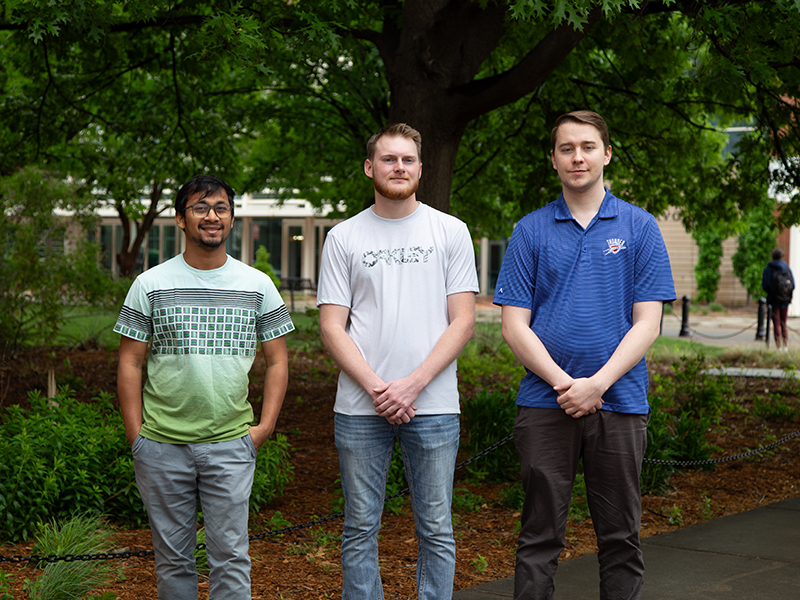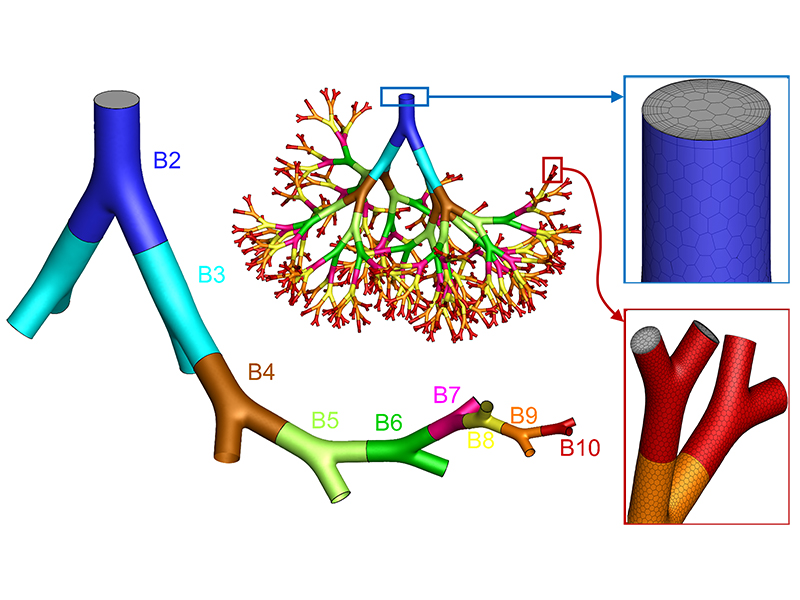
Breathing New Life: Feng's AI powered inhaler is aiding lung disease treatment
Monday, April 1, 2024
Media Contact: Desa James | Communications Coordinator | 405-744-2669 | desa.james@okstate.edu
In the heart of Oklahoma, a breath of fresh air is transforming the field of pulmonary health care.
Dr. Yu Feng, a visionary researcher in the School of Chemical Engineering in the College of Engineering, Architecture and Technology at Oklahoma State University, is leading an innovative project funded by the University of Oklahoma Foundation.

Titled “Artificial Intelligence Empowered User-Centered Smart Inhaler for Targeted Drug Delivery to Small Airways for Effective Lung Disease Treatment,” this project promises to transform how people combat debilitating lung diseases such as chronic obstructive pulmonary disease.
In college, Feng noted the ineffectiveness of current inhalers in delivering medications to designated lung sites. During his senior year, Feng also witnessed a close friend struggle with managing both COPD and cystic fibrosis. Tragically, this friend lost most of their pulmonary function and was deeply affected mentally, which ultimately led to their premature death in 2007. This profound experience motivated Feng to develop solutions like the smart inhaler, aiming to improve the quality of life for patients facing similar challenges.
“Since my undergraduate years in China, where I majored in fluid dynamics, I’ve been deeply interested in exploring how classical fluid dynamics theories can extend beyond traditional applications like rocket science and turbines to health care,” Feng said. “During my further studies, I discovered that inhalation therapy for chronic lung diseases such as COPD suffers from inefficient delivery — less than 25% of aerosolized medication reaches the targeted small airways.”
Motivated by this challenge, Feng began his Ph.D. studies at North Carolina State University to leverage technology aimed at improving medication delivery efficiency. Specifically, Feng studied engineering mechanics and specialized in fluid dynamics at Zhejiang University in China from 2003-07. His focus diverged from the traditional fields of turbines and aerospace science, which typically employ computational fluid dynamics (CFD). Instead, he took an early and distinct interest in using fundamental fluid dynamics to tackle health care challenges, specifically pulmonary health care.
Starting in 2007, Feng conducted CFD simulations to trace air movement within the
lungs. He expanded on this research while pursuing his master’s and doctoral degrees
in mechanical engineering at NCSU, concentrating on lung aerosol dynamics.
Feng then took his current faculty position where he led the development of physiologically
accurate digital twins of respiratory systems. This work aimed to deepen the understanding
of respiratory processes and enhance pulmonary health outcomes.
Feng’s interaction with the pharmaceutical industry began in 2020 through industry-funded projects on inhaler innovation, where he learned about the significant needs in inhalation therapy and recognized the value of integrating AI with CFD to innovate smart inhalers for more effective pulmonary drug delivery.
His work in lung aerosol dynamics led to his election as the academic co-chair of the Pharmaceutical Strategy Task Force of the Avicenna Alliance. This global nonprofit organization advocates for using computer modeling and simulation to accelerate the delivery of safer, more affordable health care.
“I aim to enhance the effectiveness of pulmonary drug delivery of treatments — make it precise for each patient,” Feng said.
HOW IT WORKS
The project aims to develop a groundbreaking smart inhaler that uses artificial intelligence.
With such technology, the inhaler can change the way lung diseases, like chronic obstructive
pulmonary disease, will be treated. By using computational fluid-particle dynamics
and machine learning/deep learning (ML/DL), the inhaler calculates the exact amount
of medication needed and can deliver it to the small airways where it is needed most.
“The ML algorithm processes inputs like breathing profiles, disease status and drug particle sizes to determine the optimal nozzle settings for drug release,” Feng said.
These settings are then used by the inhaler’s hardware system to adjust the nozzle, ensuring targeted drug delivery to specific lung sites while minimizing deposition on healthy tissues.
The pivotal role played by OSU doctorate student Mohammad Rashed Islam is central to the project’s success. His research focuses on using AI for precise drug delivery across various lung diseases beyond COPD. Feng emphasized the significance of Islam’s work, stating, “It establishes a targeted delivery strategy that not only ensures efficiency but also minimizes potential side effects, a significant advancement over traditional inhalation therapies.”
This isn’t just any inhaler: It’s a smart device designed to make treatments more effective and reduce the amount of medicine wasted. The idea is simple yet powerful: to provide personalized and efficient treatment for everyone.
CREATING
THE PROTOTYPE
The initial planning process for developing the smart inhaler involved extensive market
research.
Feng and his team set out to understand the needs and challenges patients and health
care workers face.
Later, the planning process included feasibility studies, defining technical specifications
and ensuring regulatory compliance.
Feasibility studies help assess whether the product concept can be practically and economically created. Defining technical specifications ensures that the product will meet the intended performance requirements, and regulatory compliance is vital for legal market entry and to ensure patient safety.
“We then utilized the established collaborations with pulmonologists, aerosol scientists and regulatory scientists to design this smart inhaler prototype,” Feng said.
What sets this project apart is its focus on accessibility. Feng emphasizes the profound impact on individuals in rural and underserved areas, where access to regular health care is limited.
“It’s about bringing state-of-the-art technology to everyday health care, making a
real difference in people’s lives,” Feng said.
Imagine a future where inhalers are not just devices but intelligent companions in
the fight against lung diseases.


THE COWBOY WAY
This project epitomizes OSU’s commitment to innovation aligned with societal needs.
The university’s strategic plan focuses on areas like enhancing human health and nurturing
interdisciplinary intersections. The smart inhaler ticks the box for both.
Feng’s dedication extends beyond research; he actively engages in STEM education and outreach, speaks at public forums to promote the public understanding of pulmonary health care and creates the ideal learning space for his students.
In the classroom, Feng has been recognized for integrating his expertise in computational engineering into several of his courses. His Computational Fluid-Particle Dynamics: Basic Theory and Selected Biomedical Applications course received the Ansys Curriculum Award for empowering his students with the ability to learn in an interactive visualization that bridges the gap between theoretical knowledge and real-world applications.
Feng’s vision is ready to breathe new life into pulmonary care on the cusp of a transformative
era in health care. His relentless pursuit of excellence not only promises to improve
the quality of life for Oklahomans but also holds implications for global health outcomes.
With each breath, the world inches closer to a future where lung diseases are no longer
a debilitating burden but a conquerable challenge, thanks to the ingenuity of Feng
and his team at OSU.
Photos: Annie Buford
Story by: Desa James | IMPACT Magazine
